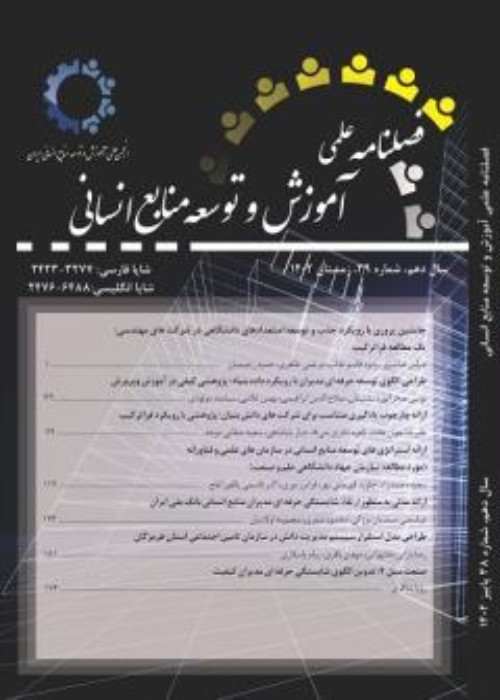The origins of teachers' professional competencies; Explain the informal learning model
The comprehensive development of education in any country depends on professional teachers; One of the most effective ways to educate teachers is to use informal learning. The main purpose of this research is to identify and prioritize informal teaching methods for high school teachers. The present study is objective in terms of purpose, exploratory in terms of subject matter, applied-developmental in nature, and descriptive-analytical study. In this study, a combined approach was used. In the qualitative part, using exploratory method, in addition to open and central coding, the methods and informal learning method were identified and in the quantitative part, using the survey method, the current situation of informal teaching methods of teachers was identified. In this research, in order to gather information in the qualitative part of the semi-constructed interview tool with purposeful sampling (snowball) and the retest method and internal agreement, a topic was performed to calculate the reliability of the interviews and in a small part to ensure the reliability of the questionnaire The Cronbach's alpha coefficient was 0.90. 349 teachers were estimated as a sample size by stochastic, random, multi-step method and using statistical determinants of the size of the population of statistical population (3724 people). Based on the research findings, 16 methods of acquiring competencies were identified, which were divided into 5 categories: discussion with others (including components of inferring from others' statements, learning through discussions and dialogue, informal verbal messages), interaction with peers (including project components). - Activity with others - Sharing experiences - Thought storm), Behavior (including components of imitation of others - Inference from the behavior of others - Admirable non-verbal behavior - Compulsory non-verbal behavior), Cyberspace (including Internet search components - Presence in networks Social) and experience (including components of trial and error during teaching - attending scientific out-of-school circles - classroom feedback feedback).
- حق عضویت دریافتی صرف حمایت از نشریات عضو و نگهداری، تکمیل و توسعه مگیران میشود.
- پرداخت حق اشتراک و دانلود مقالات اجازه بازنشر آن در سایر رسانههای چاپی و دیجیتال را به کاربر نمیدهد.




